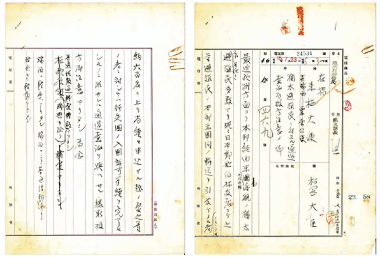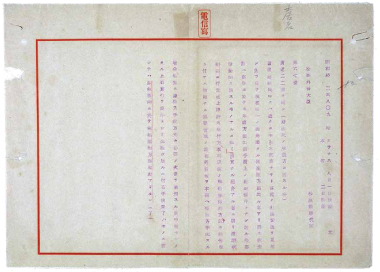Ministry of Foreign Affairs telegram

-
February 4, 1941
To: Mr. Sugihara, Consular Agent in Prague, From: Matsuoka, Foreign Minister
Re: No.10 -Confirmation on the matter of issuing visas to Jewish refugees at the Consulate in Kaunas.
February 4, 1941 , This telegram asks Sugihara to report on Jewish refugees who traveled to Japan from Lithuania. The government required him to furnish the number of visas issued, recipients' names and destinations, together with the date of each visa issued in Kaunas by mail immediately.

-
February 5, 1941
To: Mr. Matsuoka, Foreign Minister
From: Sugihara, Consular Agent in Prague
Re: No.12- Your No.10 telegram (visas for Jewish refugees)
February 5, 1941 Sugihara replied to the No. 10 telegram regarding the numbers of visas issued when he worked in Kaunas as the Consular Agent in Prague. In answer to telegram No.10 (issuing visas to Jewish refugees), he reported a total of 2,132 visas issued with 1,500 of that number granted to Jewish people. The visas were issued as regular transit visas and were the same as those issued to Polish citizens.
February 28, 1941
To: Mr. Yosuke Matsuoka, Foreign Minister
From: Chiune Sugihara, Consular Agent in Prague
Re: No.28- Report about visas processed at the consulate in Kaunas
February 28, 1941 Sugihara attached a list of the visas issued to his regular official correspondence No.28. The list spanned 32 pages and showed the serial numbers, nationality, names, whether they were entry visas or transit visas, dates of issue, fees, and references for 2,139 people.

-

July 23,1940
To: Consulate in Berlin From: Matsuoka, Foreign Minister
Re: Telegram No. 469
This is a telegraph directive which was sent to the consulate in Berlin and other locations from Mr. Matsuoka, the Foreign Minister on July 23, 1940 regarding the issuance of visas to refugees. In it he writes that there have been many Jewish and other refugees from Europe traveling to the U.S. and other countries through Japan. As a matter of fact, he states that the Berlin Branch of Nippon Yusen (NKY Line) reported that they had already accepted over 600 refugees to transit Japan to the U.S. and were expecting even more. He emphasizes that visas should only be issued to those who have already completed the immigration formalities for their destinations and to exercise caution to ensure that transit visas would not be issued in any other cases. This information was sent via Switzerland and forwarded to various locations as a regular telegram directing the staff at consulates to make certain that they would not issue any transit visas to refugees without the information necessary for their travel.

-
July 28, 1940
From: Sugihara, Consular Agent in Kaunas
Re: No.50-telegram
In his telegram of July 28, 1940, Sugihara reported that the situation in Lithuania had gotten worse and that hundreds of Jewish refugees had come to the Japanese Consulate to request transit visas. He also commented on the situation in Lithuania, mentioning the oppression of the political party by the GPU of the Soviet Union, and adding that Polish, White Russians, Jewish, and some notable politicians from the former Lithuania government had been successively arrested. He also mentioned that more than 100 Jewish refugees had come to the Japanese Consulate to get transit visas to pass through Japan to the U.S.
Showa 22785 Kaunas
July 28
Japan-Europe situation
The Ministry, July 29
Mr. Matsuoka, Foreign Minister, Sugihara, Consular Agent
No.50
The rapid development of political maneuvers by communists in this country underlies the cruel and shocking terrorism carried out by the GPU (former secret Soviet police agency). The GPU and Red Army occupied east Europe and attacked the head offices of the Polish, White Russian, Lithuanian, and Jewish political parties, confiscating lists of the party members and began arresting them three days before election day.
The arrests are currently continuing and 1,500 people were arrested in Wilno while more than 2,000 were arrested in Kaunas and other places. The majority of them were former Polish military bureaucrats, white Russian military officers, members of the "Bund" faction of the former ruling National Party, and Zionist Jews. Former Prime Minister Merkys and Urbsys were also sent to Moscow with their families.
England is now protesting to the Soviet Union both at home and in Moscow over the 6,000 poisoned Polish soldiers who were sent to Samara about a week ago. In the midst of this unstable political situation, several hundred people who had been hiding in farming villages escaped to German territories and more than 100 Jewish people have come to our consulate to obtain transit visas through Japan to the U.S.
This was also forwarded to Germany and the Soviet Union.

-
August 7, 1940
To: Mr. Matsuoka, Foreign Minister
From: Sugihara, Consular Agent in Kaunas
Re: No.58-telegram
Consular Agent Sugihara sent the telegram to Mr. Matsuoka, the Foreign Minister, on August 7, 1940 in order to ask for permission to issue visas to people who were in possession of former Czechoslovakian passports.
He sought instructions on how to deal with applicants who held passports from former Czechoslovakia and other fallen countries which no longer existed.
August 9, 1940
To: Mr. Matsuoka, Foreign Minister
From: Sugihara, Consular Agent in Kaunas Re: No.59-telegram
Consular Agent Sugihara sent the telegram to Mr. Matsuoka, the Foreign Minister, on August 9, 1940 . In it, he asks for consideration of the famous Jewish manufacturer, Mr. Bergman, as well as 15 other people for a one-month visa. The “Outline for countermeasures against Jewish people”, which was enacted on December 6, 1938 , states, "In general, Jewish persons should not be sent to Japan, Manchuria or China. However, capitalists, engineers and other possibly valuable individuals may be excepted." Sugihara asserted that Mr. Bergman and the other 15 were valuable capitalists and engineers falling under the exception and asked for permission to issue transit visas to them.

-
August 12, 1940
To: Sugihara, Consular Agent in Kaunas
From: Mr. Matsuoka, Foreign Minister
Re: No.18-telegram
This is the reply to the No.58 telegram from Sugihara, Consular Agent in Kaunas regarding the issuance of transit visas to those in possession of Czechoslovakian passports from Mr. Matsuoka, Foreign Minister on August 12, 1940 .
In it, he asserts that passports issued before the fall of Czechoslovakia on March 16, 1939 or those which bear extensions will be valid provided that they are not expired. However, a caution against issuing transit visas to refugees who are not in possession of entry permits for their destination countries is also included within it. However, according to the list of visas, he began issuing transit visas to people who had Czechoslovakian passports even after receipt of the message.
August 14, 1940
To: Sugihara, Consular Agent in Kaunas
From: Mr. Matsuoka, Foreign Minister
Re: No.21-telegram
This is the reply from Mr. Matsuoka, Foreign Minister to Sugihara, Consular Agent in Kaunas, regarding his telegram No.59 “Re: Transit visas for 16 Jewish individuals who are moving to South America”.
It has been determined that even in cases such as the Bergman group, we cannot issue transit visas in cases where entry permission from the destination country has not been granted. Our government will not issue visas without the completion of processing for entry permission by the destination country.
We cannot confirm anyone who received a regular visa in the list of visas.

-
August 18, 1940
To: Sugihara, Consular Agent in Kaunas
From: Mr. Matsuoka, Foreign Minister
Re: No.22-telegram “Handling Refugees”
This is the reply to Sugihara, Consular Agent in Kaunas from Mr. Matsuoka instructing him to limit the issuance of visas to refugees sent on August 16, 1940 .
We have been informed that some of the refugees from Lithuania in possession of transit visas through Japan to the U.S. and Canada did not have enough sufficient funds as well as incomplete entry procedures for their countries of destination, creating difficulties for the destination governments. We have been requested to deny transit visas to such individuals who lack sufficient funds to stay in Japan and who have not completed the entry procedures for their destinations.

-
August 24, 1940
To: Mr. Matsuoka, Foreign Minister
From: Sugihara, Consular Agent in Kaunas
Re: No.66-telegram (Request telegram)
This is the request from Sugihara, Consular Agent in Kaunas to Mr. Matsuoka, the Foreign Minister, asking for special permission to issue a visa on August 24, 1940 .
In it Sugihara asks for permission to issue a transit visa to “Leon Polak”, a Polish Jewish manufacturer. His wife and children had already received U.S. visas and had been issued transit visas through Japan, but “Leon Polak” himself had yet to receive a U.S. visa due to the closure of the U.S. Consulate in Lithuania and his prospects of leaving Lithuania were worsening by the day.

-
August 28, 1940
To: Sugihara, Consular Agent in Kaunas
From: Mr. Matsuoka, Foreign Minister
Re: No.23-telegram “Regarding a transit visa for Polish Jewish “Leon Polak”
This is the reply to the No.66 wire from Sugihara, Consular Agent in Kaunas to Mr. Matsuoka, the Foreign Minister.
It directs Sugihara to issue Polak a visa only after he receives a U.S. visa, and insists on him following the basic rules for issuing visas.

-

August 1, 1940
To: Mr. Matsuoka, Foreign Minister
From: Sugihara, Consular Agent in Kaunas
Re: No.67-telegram, regarding No.22 (“Handling Refugees”)
This is the reply from Sugihara, Consular Agent in Kaunas to Mr. Matsuoka, the Foreign Minister on August 1, 1940 regarding the No.22 telegram.
In it, he states that there are no other Central or South American consulates left in Lithuania to issue visas for the refugees in the country to permit them to go to the U.S. and that possession of a Japanese transit visa is required to apply for a U.S. visa. He emphasizes that a Japanese transit visa could be the difference between life and death for the refugees and points out that the current situation will result in the closure of the Japanese Consulate very soon. He states that in consideration of this he had begun issuing visas to refugees who lacked entry permits for their destination countries and those with insufficient funds after securing promises from them to obtain entry permits before their arrival in Vladivostok and arranging funds before entering Japan, clearly indicating that he had expanded his interpretation of the "Immigration Ordinance" in issuing visas.

-
September 3, 1940
To: Sugihara, Consular Agent in Kaunas
From: Mr. Matsuoka, Foreign Minister
Re: No.24-telegram “Handling Refugees”
This is the reply from Mr. Matsuoka, the Foreign Minister to Sugihara, Consular Agent in Kaunas on September 3, 1940 regarding No. 67.
Mr. Matsuoka states that the “Special Procedure” of issuing transit visas was causing major problems in Vladivostok and was destroying the integrity of the Japanese visa, while insisting that Sugihara strictly observe what was written in telegram No.22.

-
September 6, 1940
From : Saburo Kurisu, Ambassador in Berlin
To: Mr. Matsuoka, Foreign Minister
Re.: No.1169 telegram from “Kaunas” to Foreign Minister, No.67 telegram
September 6, 1940 Telegram No. 69 sent by the Berlin Embassy for Resident Consular Agent Sugihara announcing the closure of the Consulate (Telegram No. 1169).
It reports its closure on September 4th and his departure for Berlin during the evening of the same date.
Diplomatic Records Office of the Ministry of Foreign Affairs of Japan Collection